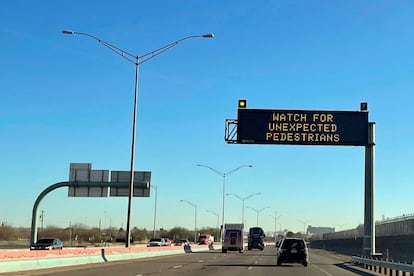Supreme Court might have easy outs on elections, immigration
A legal fight over turning away immigrants at the border because of the coronavirus pandemic is about to become irrelevant

The Supreme Court soon could find itself with easy ways out of two high-profile cases involving immigration and elections, if indeed the justices are looking to avoid potentially messy, divisive decisions.
Off-ramps in those cases could prove attractive in a term with no shortage of big cases that could divide the court’s six conservatives and three liberals. Affirmative action, voting rights, gay rights and student loan forgiveness also are on the agenda for a court that is less than a year removed from overturning nearly 50 years of constitutional protections for abortion and seeing a significant dip in public confidence.
The Biden administration provided one possible way out for the court this week. A legal fight over turning away immigrants at the border because of the coronavirus pandemic, under a provision of federal law known as Title 42, is about to become irrelevant, the administration said in a court filing Tuesday.
That’s because the administration recently announced that the public health emergency that justified the quick expulsion of immigrants will expire on May 11.
“Absent other relevant developments, the end of the public health emergency will (among other consequences) terminate the Title 42 orders and moot this case,” wrote the administration’s top Supreme Court lawyer, Solicitor General Elizabeth Prelogar.
The use of Title 42 began during Donald Trump’s presidency and continued after Joe Biden took office. It has been used millions of times to quickly turn away migrants at the border.
Title 42 is at the root of a Supreme Court case that the justices in December put on a fast track, with arguments set for March 1. At issue isn’t the use of Title 42 itself but the question of whether a group of Republican states can insert themselves into a lawsuit over the policy. The states support keeping it in place. If it ends, they say illegal immigration will increase and they argue their interests aren’t represented in the case.
The court could still rule before May 11, though that would be faster than usual. It’s also possible the policy’s end date will be pushed back beyond that date. But if the public health emergency ends as planned and the justices do nothing until then, the case could end without a decision.
When the court agreed to take the case in December, the justices were split. Five justices wanted to wade in and four justices — the court’s three liberals and conservative Neil Gorsuch — said they would not have gotten involved in the first place.
The other case the court could dodge involves a closely watched elections issue and comes out of North Carolina. Last week the state’s top court ordered a new look at the case.
Republicans in North Carolina have asked the justices for a ruling that could leave state legislatures virtually unchecked in making rules for congressional and presidential elections. Such an outcome would for the first time validate what is known as the “independent state legislature” theory, which would dramatically enhance the power of state lawmakers over elections for president and Congress at the expense of state courts.
The justices heard arguments in December in an appeal from Republicans who argued that the state Supreme Court, then with a Democratic majority, improperly tossed the state’s Republican-drawn congressional districts as excessively partisan and adopted a new map that produced a 7-7 split in November’s elections.
Now a new Republican majority on the North Carolina high court has set new arguments for March. It’s unclear how long it might to take to reach a decision.
The justices have been at work on a decision in the North Carolina case for more than two months, but the final word in this and other consequential cases often doesn’t come until late June.
So the court could wait to see what the North Carolina court does before reaching its own conclusions.
Vikram Amar, a professor at the University of Illinois College of Law, said the court can always find a way out “if it wants to dodge the case,” including if the justices are finding trouble reaching consensus.
But Amar, who filed a brief opposing the Republicans in the case, said it’s important for the court to weigh in.
“The fact that they took the case in the first place tells us they think it needs resolution. Better to resolve this between election cycles,” Amar said.
Sign up for our weekly newsletter to get more English-language news coverage from EL PAÍS USA Edition
Tu suscripción se está usando en otro dispositivo
¿Quieres añadir otro usuario a tu suscripción?
Si continúas leyendo en este dispositivo, no se podrá leer en el otro.
FlechaTu suscripción se está usando en otro dispositivo y solo puedes acceder a EL PAÍS desde un dispositivo a la vez.
Si quieres compartir tu cuenta, cambia tu suscripción a la modalidad Premium, así podrás añadir otro usuario. Cada uno accederá con su propia cuenta de email, lo que os permitirá personalizar vuestra experiencia en EL PAÍS.
¿Tienes una suscripción de empresa? Accede aquí para contratar más cuentas.
En el caso de no saber quién está usando tu cuenta, te recomendamos cambiar tu contraseña aquí.
Si decides continuar compartiendo tu cuenta, este mensaje se mostrará en tu dispositivo y en el de la otra persona que está usando tu cuenta de forma indefinida, afectando a tu experiencia de lectura. Puedes consultar aquí los términos y condiciones de la suscripción digital.








































